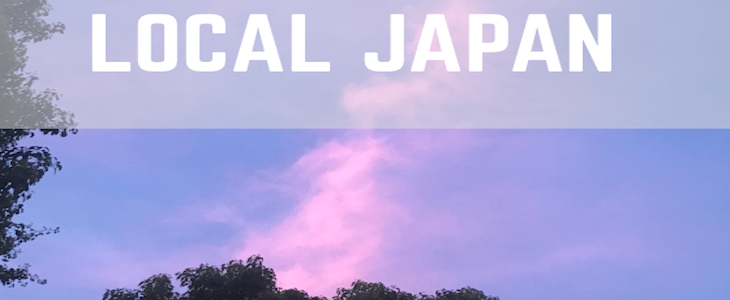
Local Japan : When your sabbatical destination becomes home
Back a few years ago, I would never think that I’d be living in Japan in a long term.
Although I’ve always envision myself living abroad, Japan wasn’t the first place I had in mind. As a child, I dreamt about Australian’s beautiful and wild landscapes. Moreover, I’ve been deeply influenced by my travels around the different American states with my family.Japan was comparable to this unreachable fantasy where harmonious contrasts between past and modernity naturally merge within its vibrant cities and people. I could imagine myself staying in Japan for a year or two, and here I am, after almost four years!Like many people from the outside world, I discovered Japan through its popular culture. From a very young age, I can recall how much I loved Magical Girl series and during my teenage years, I fell in love with Ghibli masterpieces or Final Fantasy games. My interest for the country of the rising sun became broader, and I started to become interested in topics related to Japanese politics and society.I was following the footsteps of the perfect Otaku! (no offense, I believe “Otaku” have been labelled too much and do not deserve such a bad reputation).On the other hand, my undergraduate studies in Law pull me away from Japan. Back in France, I personally felt that people who shared positive views about Japanese culture were easily labelled as geeks, nerd, tacky, old fashioned, and so forth. In addition to lacking time, a part of me instinctively lost interest in learning more about Japan. But fortunately, it did not last.Eager to travel outside the European continent, I applied for a semester abroad during my junior year (it was in the end of 2013). While I firstly had Japan in mind, my Japanese skills were non-existent (and Japanese law schools only offer programs in Japanese). On the otherhand, Korean partner Universities offered wide-range of English curriculum, both in Law and International politics. Thus, I moved to Seoul for 6 months, a journey I will hardly forget.

I took advantage of Korea’s geographic position to visit Japan for the first time, in April and in June 2014. I undeniably fell in love with the country and everything I could have imagined about Japan as a young girl was there.After my stay in Seoul and as a fresh graduate in Law and Political Science LLB (finally, and I still wonder how I studied Law for such a long time, I truly disliked it) I knew deeply that I had to continue my journey into the far east.
I had to find a way to stay in Asia as quick as possible, since I couldn’t see myself staying in France for more than 3 months. From that moment, I was convinced that my life wasn’t in France but abroad. My only wish was to continue this journey and somewhat, what I thought was a dream wasn’t anymore.
A few weeks later, I decided to enroll to a Japanese language school in Tokyo, starting in September. I assumed enrolling to a language school was the best option I could have to start my sabbatical journey in Japan: while I could study the local language, I had time to both work part-time and discover new aspects of the culture.But well, let’s be honest here…, If I had to choose one single word to describe my first year in Japan, I would say PARTY. I did party A LOT, and was crazy about it, like I was in Seoul. I’ve always been an out-going person, but my extroversion turned at its peak when I landed in AsiaJ. Me and my friends had lots of fun, and was lucky enough to get away from responsibilities for a short amount of time (thanks to my family, I was lucky enough to do so).Evidently, I also explored important aspects of the culture and more especially, I got this chance to meet wonderful people from different horizons who still are my closest friends today.
I met most of my friends in Japan during parties (and later at school), including my current partnerJ. This chapter of my life in Japan did not last more than a year. Soon enough, I had to decide whether I will stay in Japan or go somewhere else for my masters.It is also during this period that I started modelling in Japan, something I believe common for many westerners in Japan. Although being a model in Japan is getting more and more difficult, it remains a great way to gain money and work with huge groups or fashion brands (or sometimes just independent designers and studentsJ) and have fun at the same time. If I had one advice for prospective western models in Japan, it is important to remember that the concept of modeling in Japan is different and that being a model is a temporary status, unless you are on your way to become a superstarJ. More importantly, it is important to bear in mind that this industry exclusively focused on physical appearance to a certain extent that I sometimes hardly consider modeling as a skill. Nevertheless, this might be different when you start to gain experience in the field, especially for contract models.

.
Back to academia, I can recall being eager to get a further understanding of Asian politics and International issues, which made me apply for a master program in Tokyo.From the beginning of my applications process, my top choice was Waseda University. Two programs with full English tracks caught my attention: The Graduate school of Asia pacific studies (GSAPS) and the Graduate school of Intercultural communication (GSSICS).
I firstly applied for GSAPS in August 2015, which was my first choice. As the application deadline for GSSICS was starting from January 2016, I could know before this deadline if my application for GSAPS was accepted.After taking some tests and a race for recommendation letters, in November 2015, I finally get a letter of acceptance from GSAPS! I consequently decided not to apply for GSSICS and accepted GSAPS offer (PS: I will later realize that GSSICS featured programs would have been a better match for my area of study).As a Waseda GSAPS student, and in the continuity of my undergraduate studies, I firstly chose to follow a seminar/specialization in International Politics with a focus on Japan and the two Koreas. Although I was eager to build a solid knowledge about the Korean peninsula and Japan-Korea diplomatic relations, I quickly realized right after my first semester that I enjoyed even more my gender, and media culture classes. These classes also belong to the same master program, but in the case I wanted to strongly focus on these fields (closely related to media studies, sociology and cultural anthropology, or even at some point cultural marketing) I needed to change my seminar. Which I did.

Changing seminar enabled me to write a thesis about the concept of Femininity within Japanese visual culture (Manga, Animation and Game culture) and its impact on Japanese females’ behaviors and consumption choices (yes, I had to gather a massive number of information!). It was a very ambitious choice, but I strongly enjoyed writing a thesis about gender issues in Japan. As you may know, the world economic forum global gender gap report ranks Japan at 101stin the world. It lags far behind fellow G7 countries! As a matter of fact, there is uncontestably a wide range of gender issues in Japan you can address for your studies. Generally speaking, I enjoyed my time at Waseda, and I even got an opportunity to perform one semester abroad at Fudan University in Shanghai, China.

China was a very interesting but tough experience, partly because I decided not to live as most expats do but instead, I tried my best to follow a “more local” way of life.
The struggles I encountered in China were also due to my full-time model activities. From a more personal level, I did not enjoy my modelling experience in China. I can tell how happy I was to come back to Tokyo. In addition to missing my partner and my friends, I just missed my Japanese routine and realized how much I was attached to this country, despite some failures. I became truly aware of the opportunities Japan has given me, and how it enabled me to evolve as an individual. Of course, perfection as I could have imagined doesn’t exist; but, before everything, it remains important to accept the imperfections of your host country. It is sometimes hard, especially in a country like Japan which is, from a socio-cultural perspective, so different from European countries. I especially think about some conservative and passive-aggressive behaviors that may sometimes occur in Japan. I must admit that when I encounter a hostile person or face unfair situations (such as the impossibility to get a credit card in Japan only because I am a foreigner…), I tend to quickly react in an emotional way. But after picturing the person in question, I do feel bad for him or her, as she/he still isn’t used to live in our globalization era. The good thing is, these people are a minority! (PS: If not a minority, in Japan and at least, the chances you get verbally or physically aggressed are close to zero).
This will never change my fascination for the country, and gratitude for the peacefulness and serenity Japan and its inhabitants continue to provide me. I am so grateful my Japanese routine is full of discoveries. Boredom seems far way.
I look forward to seeing what the country of the rising sun will continue to offer me.J



